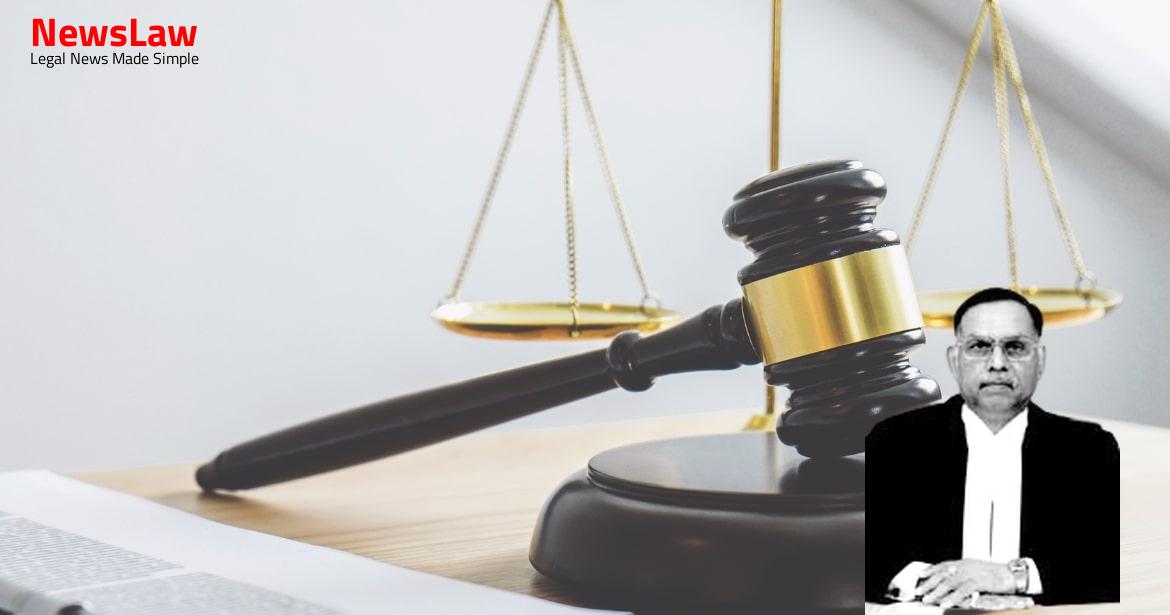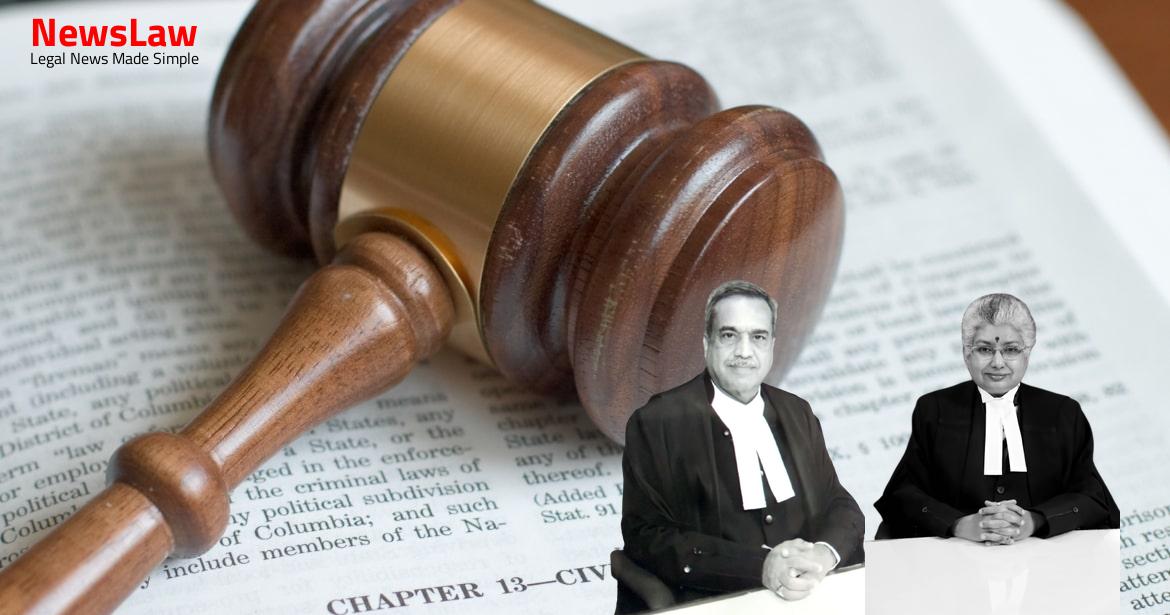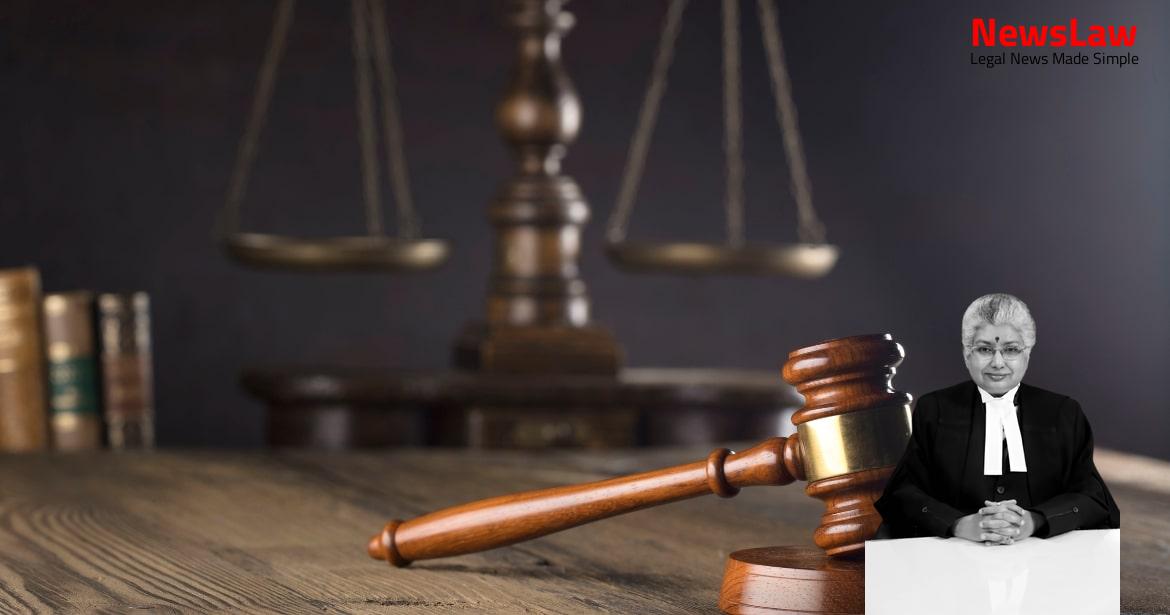Explore a compelling legal analysis centered around the proof of title in a property dispute case. The court’s meticulous scrutiny regarding the burden of proving ownership and possession unveils crucial aspects of property law. Delve into the complexities of evidentiary requirements and the significance of establishing a watertight case in property disputes.
Facts
- The First Appellate Court observed that the power deed written abroad need not be registered.
- The son of Dhasi Naidu entrusted the suit property to Ghani Sahib.
- The plaintiff filed a suit for permanent injunction against the defendants.
- The defendants claimed possession through a registered power of attorney from Dhasi Naidu’s legal heir.
- The defendants also claimed that the plaintiff’s legal heirs as per sale deed are fictitious.
- The First Appellate Court found inconsistencies in the defendant’s claims and dismissed their suit.
- The plaintiff’s case was based on documents like power of attorney and sale deed.
- The First Appellate Court concluded that the execution and authentication of power of attorney (Exhibit PW1) was not proved, impacting the validity of the sale deed (Exhibit PW2).
- The High Court allowed the second appeal by addressing three substantial questions of law and affirming the trial court’s injunction in favor of the plaintiff.
- The First Appellate Court decreed the suit, and the High Court dismissed the second appeal.
- The High Court criticized the First Appellate Court for delving into the validity of Exhibits A-1 and A-2.
- The defendants had previously filed a suit which was dismissed by the trial court, and their appeal was also rejected.
- The trial court found that the plaintiff had proven his rights and possession of the property, warranting a decree of injunction.
- All three courts referenced the earlier suit filed by the defendants and its subsequent dismissal and appeal rejection.
Also Read: Analysis of Seniority Determination in Armed Forces Personnel Case
Issue
- The trial court framed three main issues to address in the case.
- The first issue questions the availability of a permanent injunction for the plaintiff.
- The second issue involves the defendant’s claim that the plaintiff is not the true owner of the property in question.
- The third issue pertains to identifying other reliefs that may be accessible to the plaintiff.
Also Read: Analysis of Circumstantial Evidence in Criminal Conviction
Arguments
- Learned counsel for the appellants argued that the documents filed by the defendants were not considered by the trial court or the High Court.
- DW2’s deposition confirmed that Dasi Naidu’s legal heirs were Sanjeevi Naidu, Nallu Naidu, and Krishnasamy Naidu.
- The High Court noted that the plaintiff’s possession was based on the defendant’s admission in the suit.
- The trial court held that since the plaintiffs admitted the defendant’s possession, the lack of produced power of attorney by defendant was deemed acceptable.
- The High Court in paragraph 24 mentioned that the plaintiff’s possession was supported by defendant’s admissions and previous legal proceedings.
- Appellant’s counsel argued that the High Court should have determined the plaintiff’s title before decreeing the suit.
- Counsel referred to judgments in similar cases to support their argument.
- The respondent’s counsel contended that the plaintiff proved possession and title successfully, thus the injunction was rightly decreed.
- The counsel argued about the validity of the plaintiff’s sale deed and the importance of proving one’s own case to succeed.
- The suit filed by Subramanian and his daughters resulted in a dismissal, reinforcing the plaintiff’s position.
- The argument that the plaintiff can’t succeed merely due to the defendant’s failure to prove title or possession was raised.
- The failure of defendants to prove their title and possession was not a strong enough reason to decree the plaintiff’s suit.
- The counsel for the respondent could not explain how the Court of Appeal assumed the acquisition of title through a sale deed was an admitted fact when the sale deed was not produced.
- The Court of Appeal made a grave error by considering evidence of possession after the alleged purchase date through the sale deed, which was never presented in court.
- In the case, the suit for injunction by the respondent was resisted by the Municipal Committee based on the respondent’s lack of ownership and possession of the land in question.
Also Read: Land Compensation Dispute Under Kerala Forest Act
Analysis
- Both parties presented their respective claims and evidence on the question of title.
- The High Court found that the plaintiff’s possession was upheld based on established possession and previous legal proceedings.
- The High Court noted that revenue entries were not considered genuine evidence of title.
- The burden of proving title to the property was on the respondent, who failed to do so.
- The plaintiff did not mention any title dispute in the current case, as the respondent had failed in a previous suit to obtain relief.
- The High Court affirmed the principle that even a trespasser in established possession could obtain an injunction.
- The plaintiff’s success in the suit for declaration of title and possession relied solely on their own title, not the weakness of the defendant’s case.
- The lower court did not properly consider the main issue of proving title in a suit based on title.
- The court questioned the application of Section 6 of the Specific Relief Act, 1963 to the present case, as the respondent did not allege dispossession by the appellant-Municipal Committee.
- In a suit for declaration of title and possession, the burden lies on the Plaintiff to establish their own title.
- The weakness of the case set up by the Defendants does not affect the Plaintiff’s right to relief.
- The present case was a suit for injunction, not for declaration of title and possession.
- The High Court held that the suit for injunction was maintainable without delving into the title of the plaintiff, especially considering the previous litigation where the defendant had lost the suit for declaration and recovery of possession.
- The evidence filed by the defendant was considered in the case despite the submission that it was not looked into.
- The judgment in Parry v. Clissold (1907) AC 73 reaffirmed the principle that possession as the assumed owner gives title against all but the rightful owner, if the rightful owner does not assert their title within the statute of limitation.
- The principle that a plaintiff cannot seek for a bare permanent injunction without a declaration was found not applicable to the facts of this case.
Case Title: A.SUBRAMANIAN Vs. R.PANNERSELVAM (2021 INSC 65)
Case Number: C.A. No.-009472-009472 / 2010



